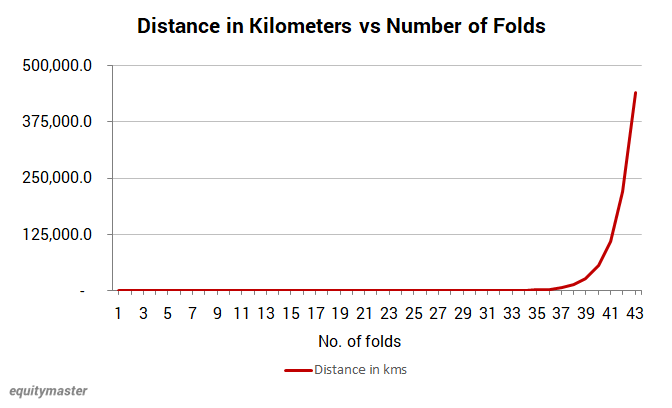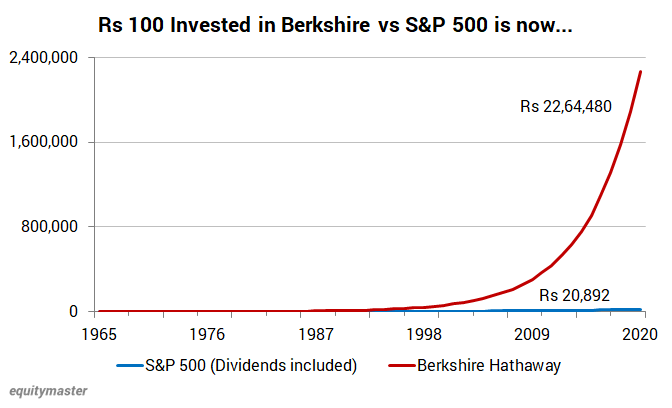India's Third Giant Leap
This Could be One of the Biggest Opportunities for Investors
- Home
- Outlook Arena
- The Power of Compounding in Stock Market
The Power of Compounding in Stock Market
Here's a small question for you.
How many times do you need to fold a 0.1 mm thick paper before it reaches the moon?
For e.g. if you fold it once, it will become 0.1 times 2 i.e. 0.2 mm thick. One more fold and you'll have a 0.4 mm thick paper and so on.
Thus, how many folds will make the paper's thickness same as the distance between earth and moon?
I know you will take out your mobile phone and do a quick google search. It will show you this...
'The moon on average is 3,84,400 kilometers from earth'.
Wow, that is helpful. We can now put the two numbers in perspective. A 0.1 mm thick paper vs 3,84,400 kilometers.
Those would be an awful lot of folds, right?
Off the top of our heads, we think that the paper would need a few hundred folds to reach the moon. After all, it was just 0.1 mm thick. Even a few thousand folds seemed entirely plausible.
Well, we are way off the mark. The right answer isn't anywhere close to these estimates.
The answer may surprise you.
All it takes for a 0.1 mm paper to reach the moon is a mere 42 folds.
Yes, that right. One can cover the distance between our planet and the moon by folding a 0.1 mm paper a mere 42 times.
Here's how it looks on a chart.

It takes 36 folds to cover just 1% of the distance. The remaining 99% of the distance is covered in 6 folds flat.
Our brains aren't very numerate, unless we train them hard. They can't calculate the distance beyond a few folds, which is hardly any distance at all.
Ask our brains to calculate the distance say on the 30th fold and it will start taking short cuts. It will think in a linear fashion and make us imagine that the moon is still many paper folds away.
But the mathematical formula at the heart of such puzzles does not work like this.
The first few paper folds barely move the needle. However, once a tipping point is reached, each successive fold is like one giant leap towards the moon.
That's the magic of compounding for you. Flying under the radar initially and then emerging as a giant object from nowhere.
Compounding will do wonders for your investing returns. It can make all the difference between a mediocre investment strategy and one with fantastic long-term results.
--- Advertisement ---
Key Information for Long-term Investors
If you're an investor looking to buy stocks for a long term, then I believe this information could be useful to you.
Our co-head of research, Rahul Shah, has uncovered a potential big opportunity.
He believes this opportunity could span several years... perhaps even decades... and it could lead to potential wealth creation on a scale we've probably never seen before.
Every Serious Investor Needs to See This
----------------------------------------
One of the Best Wealth Compounding Machines
Here's the proof in the form of a real-life example. Berkshire Hathaway, Warren Buffett's company versus the US equity benchmark index.

Isn't this an identical twin of the paper folding chart?
This is a perfect example of how to achieve great investment returns without worrying about the initial years.
As the years go by, the higher returning asset opens a big gap with the lower returning one.
And if the period is as high as 55 years and the higher returning asset is Warren Buffett's Berkshire Hathaway, the gap could be as high as 108x!
Yes, that's correct.
That is how much more an investor in Berkshire Hathaway back in 1965 would have earned over an investor in the US benchmark index S&P 500 (including dividends).
Imagine having Rs 22 lakhs versus just Rs 20,000 and change.
Or 20 crores versus just Rs 20 lakhs and change for every Rs 10,000 invested.
Yet again, the power of compounding at play.
The takeaway is simple.
The higher your returns and the longer the time horizon, the bigger the corpus.
Thus, now that you've known the power of compounding, how do you ensure its full use in your long term wealth building?
Beware of These Pitfalls
What are the steps you should take to allow compounding to play a big role in helping you make good money over the long term?
Here are the most important ones in our view.
You should not get disheartened with the gradual accumulation of your corpus in the initial years. As they say, Rome was not built in a day. This is true of wealth creation as well.
Wealth creation is a slow process, at least in the first few years.
Despite your best efforts, your wealth would not grow by much during this first phase of wealth building. It will compound slowly, often leave you wondering whether it's really worth it?
However, once the corpus reaches a tipping point, you would start seeing a marked difference. The corpus will grow substantially with each passing year once past this point.
All you have to do from now on, is not disturb the compounding process and you could see the money roll in, year after year, and making a significant contribution to your overall wealth.
One should also not be in a hurry to compound your wealth at a fast pace. At 15%, your wealth will quadruple in 10 years, at 25% it will go up by a huge 9x and at 50%, it multiplies a whopping 58x.
We have seen a lot of people trying hard to earn 25% or even more from their stock investments and in the process, end up taking significant risks.
This then backfires and instead of letting the power of compounding work for them, they botch it up and make it work against them.
They either go deep in debt from the losses incurred or lose all the wealth they had accumulated and it is all back to square one.
The Powerful Tool at Your Disposal
It should be noted that the Indian stock market has gone up a huge 500x over the last 40 odd years.
This is a CAGR of an impressive around 15%-16%.
And we have no reason to believe that this growth won't continue over the next couple of decades if not exceed.
The tool of compounding is a powerful tool at your disposal to make the most of this India growth story.
Thus, as long as you are patient and are willing to let compounding do its work and also not get too greedy and end up taking risks you shouldn't be taking, you can create immense wealth over the long term.
So, hop on the compounding bandwagon and steer clear of the obstacles that don't allow it to work its magic over the long term.
Here are Links to Some Very Insightful Equitymaster Articles and Videos on Power of Compounding
What Is Power Of Compounding And The Wonders It Does In Wealth Creation
India's Economic Growth and the Power of Compounding
A technique more rewarding than compound interest


